Outer circle
We prepare young people to blaze a trail in whatever field they choose. They leave us equipped with a breadth of skills, ready to become responsible global citizens.

We group our subjects together into six curriculum areas, teaching subjects in an integrated way as shown within our Learning Wheel.
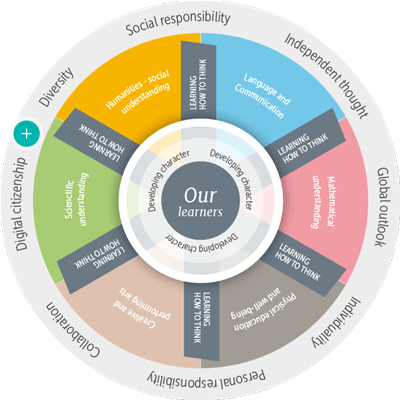
We prepare young people to blaze a trail in whatever field they choose. They leave us equipped with a breadth of skills, ready to become responsible global citizens.
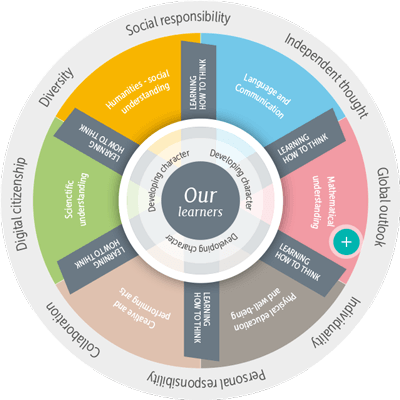
We group our subjects together into six curriculum areas. We teach subjects in an integrated way, because the future belongs to those who can think way beyond narrow subject boundaries.
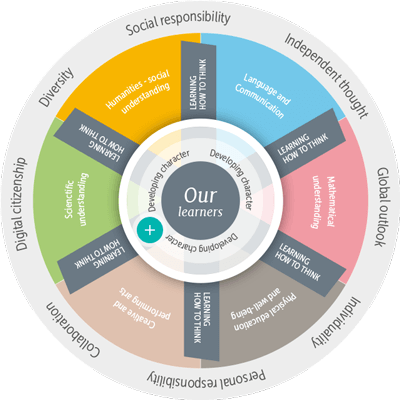
Education is not just about imparting knowledge. It’s about teaching young people how to think for themselves: critically, creatively and collaboratively.
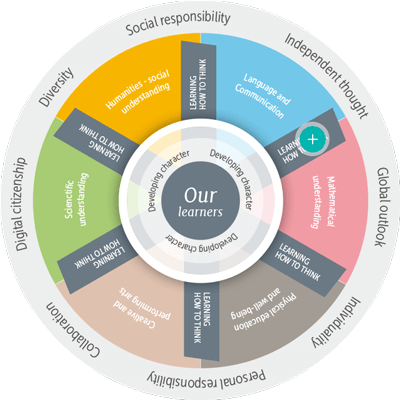
Fostering a secure bedrock of self-esteem and a sure moral compass is essential preparation for a future in a complex world.
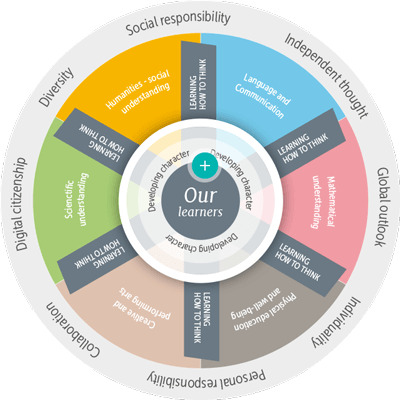
Our schools are small enough to ensure that each learner is known. By placing our learners at the centre of our approach, we create an education that allows individuality to flourish.
Please note that this information is valid for the current Year 10 cohort. Exam boards and course codes may differ for other year groups.
Below is an outline of the six curriculum areas and the (I)GCSE subject choices you'll find within them.
English Language and English Literature
Both are studied to IGCSE as part of the core curriculum.
Modern Languages
You must choose ONE Modern Language as part of the core curriculum from:
In addition, you may choose either French, German, Mandarin Chinese or Spanish as a second Modern Language in the options.
Ancient Languages
You may choose Latin as one of your optional subjects.
In addition, you may wish to take an ab initio course in Classical Greek, leading to a GCSE in two years, as one of the optional subjects. Previous knowledge of the language is not required for this.
You will take GCSE Mathematics.
You will study Biology, Chemistry and Physics. We offer a choice between:
NB: Guidance will be given as to which route is more suitable for you.
Courses in Geography, History and Religious Studies are offered. You are advised to take at least one Humanities subject among your options.
Courses in Art, Design, Drama and Music are offered in the options. You are encouraged to include a creative or performing subject among your options if possible.
All students take a double lesson per week of Games through the enrichment programme; there is the option to take four periods of physical activity. GCSE PE is also available as an option.
You will take a maximum of 10 subjects.
List of options:
*Students may choose Art or Design but not both
**Students wishing to study for individual GCSEs in Biology, Chemistry and Physics should choose ‘Triple Science’ as one of their options
Some of our courses are International GCSE (IGCSE) courses (eg English Language and Literature) and others are GCSE courses (eg Mathematics). The choice of which course to follow is taken on a case-by-case basis, and changes to specifications are kept under constant review. The type of course followed is indicated in the booklet, in each subject title. IGCSEs are, like GCSEs, Level 2 qualifications and, hence, have an equivalent value to GCSEs for university entrance purposes.
Our courses offer the new ‘9-1’ grading structure.
In addition to the subjects leading to (I)GCSE courses, you will take a non-examined core programme, comprising three elements:
In Year 10 and Year 11 all students continue with regular weekly lessons of Sport and, in addition
to the core team sports they have been playing in their Games lessons so far, can choose from a
variety of options, including rowing, Zumba, yoga, badminton and spinning.
In Years 10 and 11, students receive timetabled lessons with dedicated teachers to cover PSHEE
(Personal, Social, Health and Economic Education) and RSE (Relationships and Sex Education)
topics.
Regular timetabled lessons throughout Years 10 and 11 provide tailored information, inspirational speakers and discussions with our Guidance team enabling students to make fully informed choices for the next stages of academic study, university degrees and the world of work
In Year 10 and Year 11 all students continue with regular weekly lessons of Sport and, in addition to the core team sports they have been playing in their Games lessons so far, can choose from a variety of options, including rowing, Zumba, yoga, badminton and spinning.
In Years 10 and 11, students receive timetabled lessons with dedicated teachers to cover PSHEE (Personal, Social, Health and Economic Education) and RSE (Relationships and Sex Education) topics.
These lessons cover a number of areas, with the aim of supporting students with all aspects of their wellbeing, both now and in the future. There is a strong focus on mental health and wellbeing, and on recognising and learning how to respond to di?cult emotions, including stress, and how to seek help and support.
These lessons also cover much of the statutory Relationships and Sex Education curriculum content that all students in the UK are required to learn about before reaching the end of Year 11. In Years 10 and 11, this includes discussing consent and how it can be communicated, and the role of technology in relationships. Students also learn about recognising healthy relationships, and the characteristics of abusive or coercive relationships. Topics such as contraception, pregnancy and fertility, and sexually transmitted infections are also revisited and further explored. Across all topics, lessons stress the need to recognise and use reputable sources of factual information about issues like sexual health, as well as conveying information about what the law says regarding sexual activity and behaviour in relationships. Underlying all lessons is a consistent message about the importance of respect, communication and trust in all relationship.
Regular timetabled lessons throughout Years 10 and 11 provide tailored information, inspirational speakers and discussions with our Guidance team enabling students to make fully informed choices for the next stages of academic study, university degrees and the world of work.
Workshops and the Unifrog platform enable students to compile their own portfolio of qualifications, skills and experiences in preparation for advanced study and employment. Taster sessions and small group discussions allow students to gain further insight into how subjects are taught at sixth form and help with decision making; they also introduce students to subjects not taught at GCSE such as Psychology, Sociology, Politics, Economics and more.
A work experience programme that includes support for both virtual and in person work experience opportunities starts in the January of Year 10, continuing in Year 11 and into Years 12 and 13 of our Sixth form. This opens up opportunities through a number of platforms and Foundation links to assist with internship and vacation job applications, career awareness when choosing A levels and degree courses, volunteering as well as university preparation in the sixth form.
You will be helped to consider aspects such as how to choose A levels subjects for the Sixth Form and continue your work with the university platform Unifrog to log activities and competencies. In addition, you will undertake further psychometric testing through Morrisby and use this platform to support your academic choices in light of future career goals.
The Year 11 programme also comprises a mix of talks, small group discussions and workshops. We help you formulate your CV and to make applications for a range of opportunities whilst drawing information from Year 10 and Year 11 together in a ‘Launch Me’ portfolio that enables you to move on to Sixth Form with clear directions. Teaching and Learning at Sixth form can be slightly different from GCSE and we try to make sure you are ready for the next stage of your academic journey.
Clubs, support and enrichment
We have over 140 lunchtime and after school clubs, support and enrichment sessions, many of which are open to students in Years 10 and 11. These are updated regularly on the clubs area of the website.
Adventure learning
Building on our structured programme of adventure learning trips and activities for Years 7, 8 and 9, we run Bronze Duke of Edinburgh expeditions for Year 10 students at the start of the academic year, and Silver training and expeditions the following summer. Through our partnership with the Exploration Society, we are also developing an exciting programme which runs into the 6th Form, and includes challenging trips around the globe.
"Teaching in the Senior School stimulates pupils’ interest and enables outstanding progress in knowledge, understanding and skills. Teachers are aware of the pupils’ individual needs, strengths and weaknesses."
ISI Report 2014